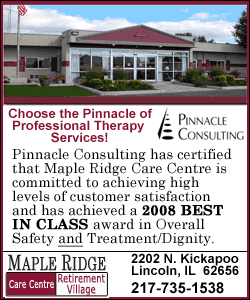|
Gov.
Blagojevich calls on media, parents to unite in preventing drug
abuse
New
public service announcements include messages about over-the-counter
and prescription drugs, the fastest-growing drugs of abuse among
teens
 Send a link to a friend
Send a link to a friend
[May 16, 2008]
CHICAGO -- Gov. Rod R.
Blagojevich announced that the Illinois Department of Human Services
and Prevention First, a state affiliate of the Partnership for a
Drug-Free America, have unveiled new messages alerting parents and
young people to the dangers of illegal and prescription drug abuse.
The public service announcements, which begin airing this month on
radio and television stations statewide, include new messages about
prescription and over-the-counter drug abuse. With the campaign,
Blagojevich is asking media outlets in Illinois to join him in
stepping up efforts to stop drug use, especially among young people.
|
 "Too many young lives are devastated or cut short by illegal drug
use or abuse of prescription and over-the-counter drugs," said
Blagojevich. "We are pleased to partner with parents and the media
on these new anti-drug public service announcements. Our efforts
have the most impact when the media, parents, schools and
communities work together to prevent drug abuse." "Too many young lives are devastated or cut short by illegal drug
use or abuse of prescription and over-the-counter drugs," said
Blagojevich. "We are pleased to partner with parents and the media
on these new anti-drug public service announcements. Our efforts
have the most impact when the media, parents, schools and
communities work together to prevent drug abuse."According to a
2007 report by the Office of National Drug Control Policy,
prescription drugs are the most commonly abused drug among 12- and
13-year-olds, and prescription drugs are now as popular as
marijuana. The report says new users of prescription drugs have
caught up with new users of marijuana.

The painkillers OxyContin and Vicodin are the most commonly
abused prescription drugs by teens, and these drugs are most often
acquired from friends or family members, according to the report.
Over-the-counter drugs are even easier to acquire and can be easily
misused.
The Illinois Department of Human Services administers the state's
substance abuse prevention programs and funds
Prevention First, a
comprehensive drug prevention organization assisting professionals
and communities through training in effective drug prevention
practices, information services and anti-drug public awareness
campaigns.
Prevention First, the Illinois affiliate of the Partnership for a
Drug-Free America, is distributing anti-drug TV, radio and print
messages throughout the state. During 2007, stations donated more
than $750,000 in airtime for ads by the Partnership for a Drug-Free
America.

"We are working closely with the governor, state agencies and
local community service organizations to ensure that every community
in Illinois benefits from the public service messages we recently
released to the media," said Karel Ares, Prevention First executive
director. "These messages give parents and other adults the support
and information they need to keep teens from ever trying drugs,
which is one of the most effective ways to reduce overall drug use
in our communities."
[to top of second column]
 |

According to statistics compiled by the
Partnership for a Drug-Free
America:
-
Four of 10 high
school students have used any substance, alcohol or other drugs,
in the past month.
-
Nearly one in five
teens (19 percent, or 4.5 million) report abusing prescription
medications to get high.
-
Nearly one-third
of teens (31 percent, or 7.3 million) believe there's "nothing
wrong" with using prescription medicines without a prescription
"once in a while."
-
One in 10 (10 percent, or 2.4 million)
report abusing cough medicine to get high.

"Educating parents is crucial to helping prevent drug abuse and
intervene with those who may have a drug addiction problem," said
Illinois Department of Human Services Secretary Carol L. Adams,
Ph.D. "Kids who learn a lot about the risks of drugs from their
parents are up to 50 percent less likely to use drugs."
The Partnership for a Drug-Free America has a new campaign, Time
to Talk, that is focused on encouraging and supporting parents and
caregivers to have frequent and positive conversations with their
teens to keep them healthy and drug-free. Prevention First will
launch the campaign in Illinois later this year.
Time To Talk provides
parents with practical tips, tools and information to not only start
the conversation, but to keep it going.
[Text from file received from
the
Illinois Office of
Communication and Information]
 |